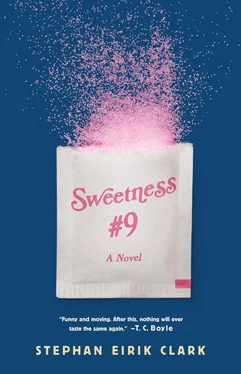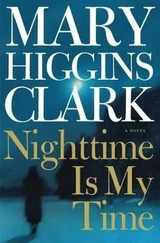That morning, after only five or ten minutes of strained conversation, I couldn’t take the anticipation any longer, and I think that’s why I said, “Why’d you hire me?” Just like that, like a streaker breaking onto the field. “At Greystone Park of all places, I mean.”
He had been speaking about the subtlety of flavors found in a new microwaveable jambalaya, but here he paused for a long moment and reached for a slice of cheese. “You were a scholar of American culture,” he said.
I smiled weakly, and he must have seen that I couldn’t believe it anymore, so he started again.
“We’re very similar,” he said. “Do you know that?”
“Are you saying you too once summered at a state hospital?”
He bit into a piece of dark bread, telling me he didn’t know what good a state hospital would have done when the entire continent of Europe had gone mad. “I went into a factory,” he said. “This was after they finally let me into this country. I was no displaced person, you know. Certainly not a Jew. I was a German who had been in the bunker. It didn’t matter that I was only a flavorist; I had to fight for that stamp in my passport. Fight,” he said.
He looked up to the cuckoo clock over the door as it chimed the quarter hour.
“When at last they did let me in, I didn’t care for anything anymore. My sisters were gone, my friends, and a girl I knew, the most beautiful girl. I had nothing, not even the desire to work. For the first time in my life,” he said, “flavor meant nothing. So I went into a factory and asked for a job. Manual labor. The simple life. This is what I thought would save me.”
He sipped his coffee and spoke to the center of the table.
“If I can surround myself with so many moving parts, if I can join an assembly line, I can become a machine.” He smiled at the memory. “To stop thinking. To forget. This is what I was after, but I might as well have tried to commune with the saints.”
He looked up and found my eyes. “In that factory we were making fertilizer. From ammonium nitrate.” He laughed shortly. “The same ammonium nitrate this same factory had used to make bombs during the war. ‘There’s a growing Communist Menace,’ the foreman said. ‘The government needs us to remain vigilant.’ So we planted our bombs in the fields in case we needed to drop them again from the skies.” He looked away, off to his silent cuckoo. “I wasn’t yet even thirty, and all of my blond hair — it had gone white.”
He brought his cup to his mouth, but set it down before drinking.
“There’s no escaping life, so I quit that factory and used my savings to rent out a floor above a Jewish dress-maker in the Garment District. You know the rest. I almost failed until I talked to that reporter about Hitler and became an overnight success. I moved FlavAmerica to New Jersey. Even remembered my love of the female form. Then one night at the Holiday Inn a friend from Goldstein, Olivetti, and Dark”—he glanced at me—“they’re not all so bad over there, you know. He tells me about your troubles.”
I looked to the edge of the table nearest the wall, where the porcelain sugar holder stood bookended by the salt and pepper shakers.
“He talked about you as if you were crazy, but if you were, I thought I must be too. So you saw a few things you wished you hadn’t, or stood for a moment in the shadow of something larger than you cared to know. And for this you should lose your dreams? Your life?” He shook his head. “You stayed in my thoughts. I never had children. Maybe I was reaching the age where I stopped always thinking of myself. I began to ask around.” He smiled. “To park outside the Japanese like you did, to lay on the horn and honk. It spoke well of your determination, your spirit. So when I learned you had taken a job at a gas station, I called your wife — I had an old résumé of yours on file — and she told me it was worse than I believed. My information was already outdated. You had moved on to Greystone Park.”
Again he looked at me. “You were no crazier than I was after the war. I knew it even before you had the presence of mind to tell me Gordon Lightfoot was a Canadian. So I gave you a second chance. Is that so wrong? It’s what America gave me. It’s what America promises. And what are we supposed to do on this planet if not give back what we have already received?”
I sat there like a man in the confessional — eyes averted, hands busy — wanting nothing more than to be out of there, but only after everything had been said. “So you know?”
“I know what I know,” he said. “What good does talking about it do?”
He poured from the French press, freshening my cup and then his own.
“And how come you never told me before?”
“You needed to forget.”
He reached for a packet of sweetener and poured it into his coffee. I pointed. “You’re doing it again,” I said. “How can you be doing it again after everything you just said?”
He raised his voice—“It’s Eliza!”—and swatted at the air over his cup, saying he wouldn’t get confused if it wasn’t for Eliza. “She prefers this sweet stuff. I only buy it because of her.”
“Well, you should tell her to stop.”
“She’s a fifty-nine-year-old woman.”
“There’s no reason for the confusion,” I said, reaching for and laying out two packets on the table: one sugar, one Sweetness #9. “The Nine has this little pink bar,” I said, pointing to it on the packet’s lower right-hand corner. “You just need to arrange them”—and now I dumped all the packets on the table and began doing just that—“so the pink bar is visible.”
Ernst smiled as I returned the packets to the porcelain holder, now all neatly organized.
“I appreciate your help,” he said, “but I’m an old man. At my age, what danger can danger possibly pose anymore?”
When I came home that evening, I parked in the garage and stepped out to my workbench, over which I’d pinned a piece of graph paper that I kept hidden beneath a map of the world that I’d received with an issue of National Geographic. Usually I exposed it only after everyone else had gone to bed, or when I knew I was alone. But this evening I couldn’t wait, or I didn’t care.
On that piece of graph paper, I’d charted the amount of time I’d kept my son within visual range since the end of July. The dates ran along the bottom of the sheet of paper; the minutes and hours went up the side. The first couple of weeks of my study had been quite promising; the black line rose and fell as if charting the progress of a bull market. But things had become more bearish of late, ever since the end of a James Bond marathon on TNT. Sadly, I suspected our numbers would only grow worse now that school had started up again.
After turning indoors, I found Betty in the great room, with her legs curled in beneath her and a bowl of ice cream balanced on one knee. I sat down beside her, not saying a word, just thinking of all that charted silence, and worrying that the sins of the father were in fact visited upon the son.
“I know, I know,” Betty said. My ghostly look was like a vacuum; Betty had filled it with her own anxieties. “I shouldn’t be eating this.” She licked her spoon. “I’ve gained five pounds since summer, when usually I lose that much — if only so I can gain it back over the holidays. But it was just so hot today.”
I gave my wife’s thigh a quick rub, telling her she shouldn’t worry so much about her weight. “You look wonderful.”
“I don’t need your rote encouragement.”
“There’s nothing rote about it.”
“You haven’t looked at me in years,” she said.
I looked at her. “Don’t be ridiculous.”
“What did I wear to work this morning?” She sat there in her house clothes, a pair of khaki shorts and an orange top. “You don’t know, do you?”
Читать дальше












